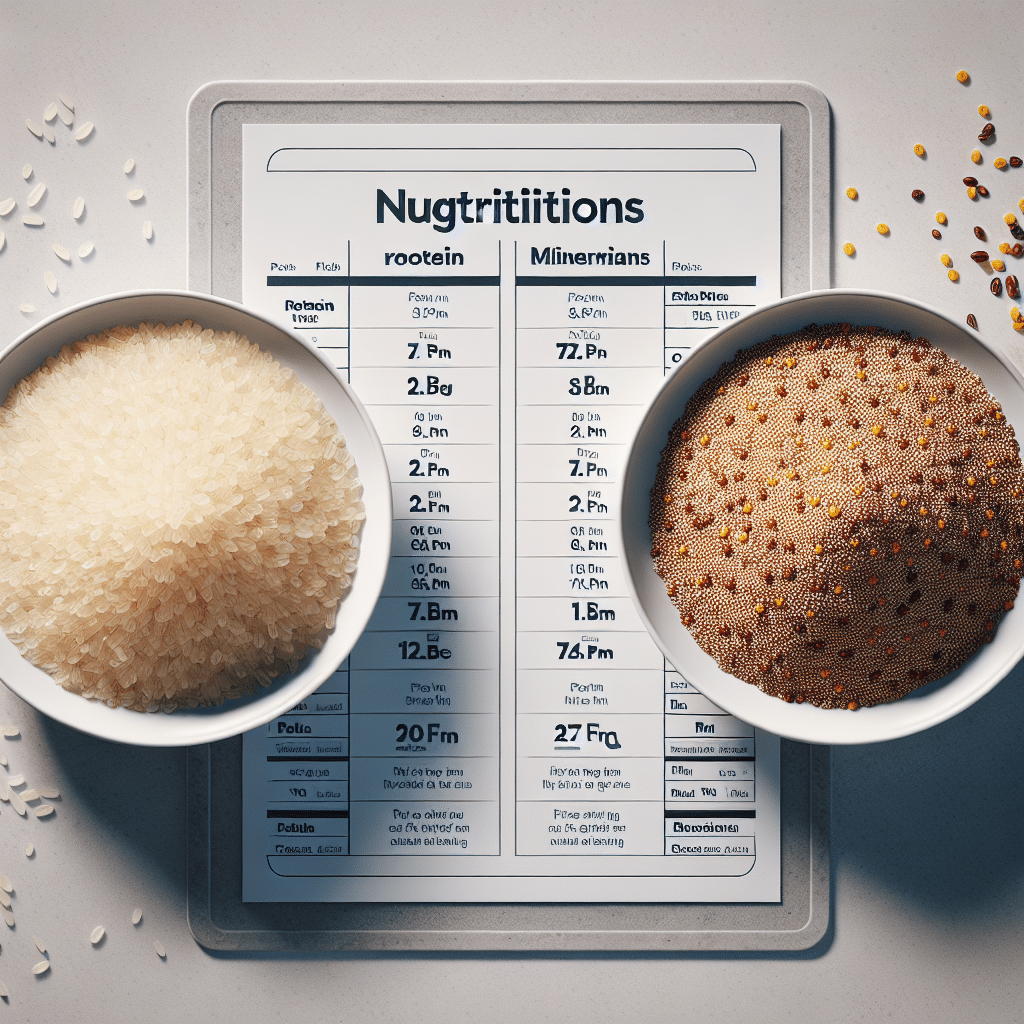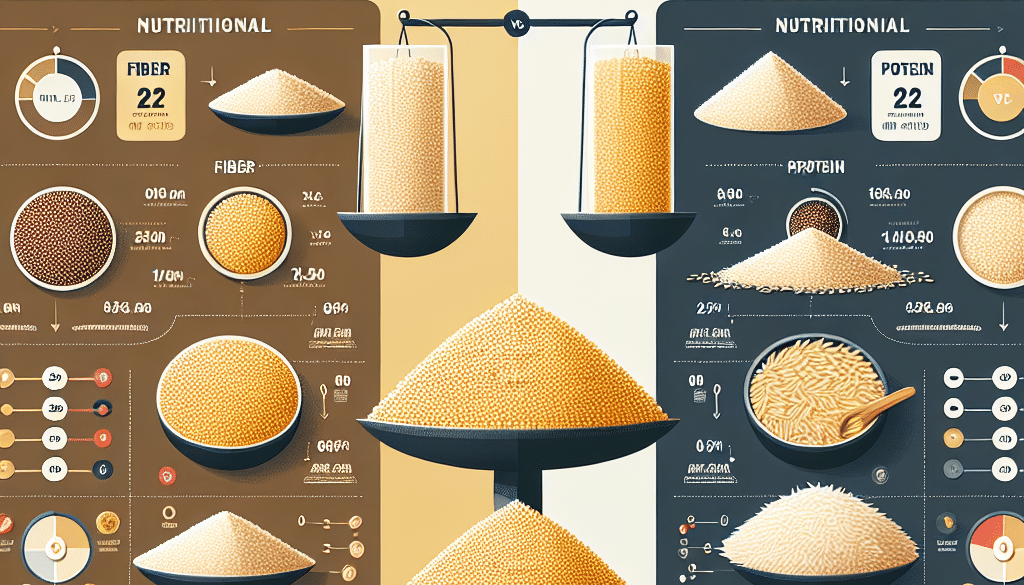Is Quinoa Healthier Than Rice?
-
Table of Contents
- Quinoa vs. Rice: Which Grain Reigns Supreme for Health?
- Nutritional Showdown: Quinoa vs. Rice
- Health Benefits of Quinoa
- Health Benefits of Rice
- Potential Drawbacks
- Environmental and Ethical Considerations
- Conclusion: Balancing Health with Personal Needs
- Enhance Your Diet with ETprotein’s Quality Protein Products
Quinoa vs. Rice: Which Grain Reigns Supreme for Health?

When it comes to choosing a staple grain for meals, rice has long been a global favorite. However, in recent years, quinoa has emerged as a trendy and purportedly healthier alternative. This article delves into the nutritional profiles of both grains, examining their health benefits and potential drawbacks to determine whether quinoa truly is the superior choice.
Nutritional Showdown: Quinoa vs. Rice
Understanding the nutritional content of quinoa and rice is crucial to evaluating their health impacts. Here’s a breakdown of what each grain has to offer:
- Protein Content: Quinoa is often hailed for its high protein content, boasting all nine essential amino acids, making it a complete protein. Rice, particularly white rice, falls short in this category.
- Fiber: Fiber is vital for digestive health, and quinoa contains nearly twice as much fiber as white rice. Brown rice, however, is a whole grain and provides a competitive amount of fiber.
- Vitamins and Minerals: Quinoa is rich in vitamins and minerals, including iron, magnesium, potassium, and zinc. Brown rice also contains these nutrients but in smaller amounts. White rice is often enriched to replace lost nutrients during processing.
- Calories and Carbohydrates: Both grains are similar in their calorie and carbohydrate content, though quinoa has a slightly lower glycemic index, which may be beneficial for blood sugar control.
Health Benefits of Quinoa
Quinoa’s unique nutritional profile translates into several health benefits:
- Weight Management: The high fiber and protein content in quinoa can help you feel full longer, potentially aiding in weight management.
- Gluten-Free: For individuals with celiac disease or gluten sensitivity, quinoa is a safe and nutritious gluten-free grain alternative.
- Metabolic Health: The lower glycemic index of quinoa may help maintain healthy blood sugar levels and reduce the risk of type 2 diabetes.
- Heart Health: Quinoa’s fiber, potassium, and magnesium content can contribute to cardiovascular health by lowering blood pressure and cholesterol levels.
Health Benefits of Rice
Rice, particularly brown rice, also offers health benefits:
- Whole Grain Goodness: Brown rice is a whole grain, which has been linked to a lower risk of heart disease, certain cancers, and type 2 diabetes.
- Energy Source: As a carbohydrate-rich food, rice provides energy for daily activities and is a staple in many athletes’ diets.
- Digestive Health: The fiber in brown rice supports digestive health and regular bowel movements.
- Accessibility and Affordability: Rice is widely available and often more affordable than quinoa, making it an accessible health food for many populations.
Potential Drawbacks
Despite their benefits, both grains have potential drawbacks:
- Arsenic in Rice: Rice can contain traces of arsenic, a toxic element. Consuming a varied diet and rinsing rice thoroughly can help reduce exposure.
- Phytic Acid in Quinoa: Quinoa contains phytic acid, which can inhibit mineral absorption. Soaking or rinsing quinoa can help minimize this effect.
Environmental and Ethical Considerations
The sustainability and ethical implications of quinoa and rice production are also worth considering:
- Water Usage: Rice cultivation typically requires significant amounts of water, which can strain local water resources. Quinoa is more drought-resistant and requires less water.
- Impact on Local Communities: The rising popularity of quinoa has had mixed effects on local Andean communities, where it is a staple crop. While it has brought economic benefits, it has also led to increased prices and reduced accessibility for locals.
Conclusion: Balancing Health with Personal Needs
In the debate of quinoa versus rice, quinoa appears to have a nutritional edge, particularly when it comes to protein content and micronutrients. However, both grains have their place in a balanced diet. The choice between quinoa and rice should be based on personal health goals, dietary restrictions, and ethical considerations. Incorporating a variety of grains can provide a wide range of nutrients and minimize potential drawbacks.
Enhance Your Diet with ETprotein’s Quality Protein Products
If you’re looking to supplement your diet with high-quality protein, ETprotein offers a range of organic and allergen-free protein products. Their selection includes organic rice protein, which can be a great addition to your meals if you prefer rice but want to boost its protein content. ETprotein’s products cater to various industries and dietary needs, ensuring that you can find the perfect protein solution for your health and wellness goals.
About ETprotein:
ETprotein, a reputable protein and L-(+)-Ergothioneine (EGT) Chinese factory manufacturer and supplier, is renowned for producing, stocking, exporting, and delivering the highest quality organic bulk vegan proteins and L-(+)-Ergothioneine. They include Organic rice protein, clear rice protein, pea protein, clear pea protein, watermelon seed protein, pumpkin seed protein, sunflower seed protein, mung bean protein, peanut protein, and L-(+)-Ergothioneine EGT Pharmaceutical grade, L-(+)-Ergothioneine EGT food grade, L-(+)-Ergothioneine EGT cosmetic grade, L-(+)-Ergothioneine EGT reference grade and L-(+)-Ergothioneine EGT standard. Their offerings, characterized by a neutral taste, non-GMO, allergen-free attributes, with L-(+)-Ergothioneine purity over 98%, 99%, cater to a diverse range of industries. They serve nutraceutical, pharmaceutical, cosmeceutical, veterinary, as well as food and beverage finished product distributors, traders, and manufacturers across Europe, USA, Canada, Australia, Thailand, Japan, Korea, Brazil, and Chile, among others.
ETprotein specialization includes exporting and delivering tailor-made protein powder and finished nutritional supplements. Their extensive product range covers sectors like Food and Beverage, Sports Nutrition, Weight Management, Dietary Supplements, Health and Wellness Products, and Infant Formula, ensuring comprehensive solutions to meet all your protein needs.
As a trusted company by leading global food and beverage brands and Fortune 500 companies, ETprotein reinforces China’s reputation in the global arena. For more information or to sample their products, please contact them and email sales(at)ETprotein.com today.












